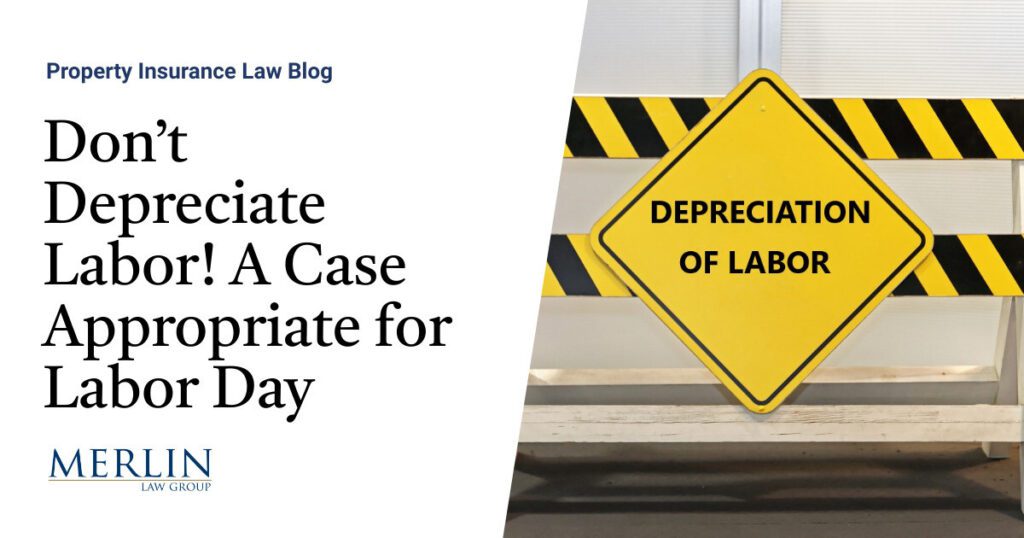Don’t Depreciate Labor! A Case Appropriate for Labor Day

Labor Day is the traditional end of summer. I often try to write a special blog for our various holidays. A favorite is Labor Day on the Jersey Shore and the Ocean Sand Exclusion. Given the history of the American labor movement and the importance of organized labor to strike, last year’s post, Is Milk Spoiled By A Labor Strike Covered Under Commercial Insurance? was fitting as well.
The depreciation of labor when valuing actual cash value is an often debated topic. I noted this topic earlier this year in Depreciation of Labor Issues Are Largely Being Determined in Class Action Cases, where I stated:
The trend is that these class action lawsuits will continue to develop the law on the depreciation of labor. I will try to keep readers abreast of the developments. Please use the search function of this blog to help locate the law for any specific state.
Remember that many policies now define actual cash value using very non-traditional methods. Why regulators are approving these forms, which usually allow insurers to reduce payments owed for traditional concepts of actual cash value, is beyond me and simply wrong.
Keeping readers abreast of these developments regarding depreciation of labor seems very fitting today.
Another class action case was recently decided in favor of the policyholders for a second time. 1 The federal judge denied Allstate’s Motion to Dismiss Plaintiffs’ Second Amended Complaint. The court previously held in denying Allstate’s first Motion to Dismiss that the Fifth Circuit’s decision in Mitchell v. State Farm Fire & Casualty Company 2 was dispositive, as there were no relevant distinctions between Mississippi law applied in Mitchell and Texas law on contract interpretation, or between the actual cash value policy provisions at issue. In the second Motion to Dismiss, Allstate argued Texas law defines actual cash value (ACV) as “fair market value,” unlike Mississippi. However, the court found the cases Allstate cited were distinguishable and did not change the court’s prior analysis or abrogate Mitchell.
Allstate also argued the policy language in this case was distinguishable from Mitchell. However, the court declined to consider the insurance policies attached to Allstate’s motion, as its review was limited to the complaint. The court concluded the relevant policy provisions, state law rules of construction, and arguments were substantially like Mitchell, which therefore remained dispositive.
The case is not over, and the court’s final rulings may be different. The lesson for all property insurance adjusters is to keep abreast of state case law developments regarding depreciation of labor, note any bulletins from state insurance departments, such as the one noted from Alaska this summer, in Depreciation of Labor to Arrive at Actual Cash Value—Alaska Says No, and read the policy language which is increasingly changing the definition of actual cash value and other traditional valuations of loss.
Thought For The Day
If any man tells you he loves America, yet hates labor, he is a liar. If any man tells you he trusts America, yet fears labor, he is a fool.
—Abraham Lincoln
1 Sims v. Allstate Fire & Cas. Ins. Co., no. SA-22-00580, 2024 WL 3908739 ( W.D. Tex. Aug. 21, 2024).
2 Mitchell v State Farm Fire & Cas. Co., 954 F.3d 700 (5th Cir. 2020).



